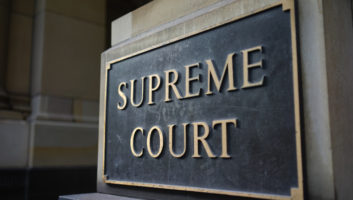
A long-awaited decision from the U.S. Supreme Court says the FCC acted properly when it moved to eliminate some radio and TV ownership rules. The court’s unanimous decision released today is a victory for the FCC and a defeat for groups that worry further consolidation will decrease ownership opportunities for women and minorities.
The FCC released new media ownership rules in 2017 to abolish the newspaper/broadcast and radio/TV cross ownership rules, and relax several local TV ownership regulations. The FCC concluded the three rules were no longer necessary to promote competition, localism, or viewpoint diversity and would not harm minority or female ownership.
[Read: Supremes to Hear Broadcast Dereg Case]
Prometheus Radio Project and several other public interest groups petitioned for the courts to intervene arguing the FCC’s decision to repeal or modify the three rules was arbitrary or capricious under the Administrative Procedure Act (APA) and rested on flawed data.
The U.S. Court of Appeals for the Third Circuit in Philadelphia agreed with Prometheus and vacated the FCC’s 2017 order. Today’s Supreme Court ruling reverses the judgment of the Third Circuit.
Justice Brett Kavanaugh delivered the unanimous 9–0 opinion of the court citing the Communications Act of 1934 and the broad authority it grants the FCC to regulate broadcast media in the public interest. The FCC is directed to review its media ownership rules every four years and repeal or modify rules that no longer serve the public interest.
The Supreme Court found: “The APA’s arbitrary-and-capricious standard requires that agency action be reasonable and reasonably explained. Judicial review under that standard is deferential, and a court may not substitute its own policy judgment for that of the agency. A court simply ensures that the agency has acted within a zone of reasonableness and, in particular, has reasonably considered the relevant issues and reasonably explained the decision.”
The Supreme Court agrees that the FCC concluded correctly after examining data that repealing the two cross-ownership rules and modifying the Local Television Ownership Rule would “deliver on the commission’s promise to adopt broadcast ownership rules that reflect the present, not the past.”
The FCC order “was reasonable and reasonably explained,” Kavanaugh wrote.
Kavanaugh’s written opinion concluded: “In light of the sparse record on minority and female ownership and the FCC’s findings with respect to competition, localism, and viewpoint diversity, we cannot say that the agency’s decision to repeal or modify the ownership rules fell outside the zone of reasonableness for purposes of the APA.”
The Supreme Court in its ruling noted the Third Circuit has repeatedly rejected the FCC’s efforts to modify its ownership rules for the last 17 years.
“As a result, those three ownership rules exist in substantially the same form today as they did in 2002,” the SCOTUS opinion stated.
The FCC contends that rapidly evolving technology and dawning of new media outlets — particularly cable and internet — has rapidly transformed how Americans obtain news and consume media, rendering some rules obsolete. The FCC contends that permitting efficient combinations among radio, TV and newspaper outlets would actually benefit consumers.
"Media" - Google News
April 02, 2021 at 04:51AM
https://ift.tt/3rJM4uQ
Supreme Court Rules on Media Ownership Question - Radio World
"Media" - Google News
https://ift.tt/2ybSA8a
https://ift.tt/2WhuDnP
Bagikan Berita Ini














0 Response to "Supreme Court Rules on Media Ownership Question - Radio World"
Post a Comment